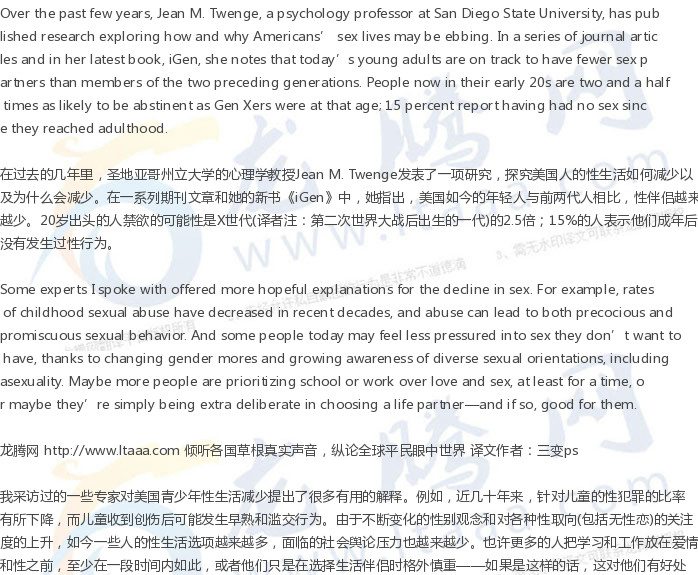【大西洋月刊】为什么(美国)青少年性生活越来越少? [美国媒体]
(美国)认为婚前性行为“一点都没错”的美国人的比例达到了历史新高,艾滋病新感染病例处于历史最低水平。并且大多数女性——最终——都能自由堕胎,并很容易获得避孕药。
The share of Americans who say sex between unmarried adults is “not wrong at all” is at an all-time high. New cases of HIV are at an all-time low. Most women can—at last—get birth control for free, and the morning-after pill without a prescription.
(美国)认为婚前性行为“一点都没错”的美国人的比例达到了历史新高,艾滋病新感染病例处于历史最低水平。并且大多数女性——最终——都能自由堕胎,并很容易获得避孕药。
But despite all this, American teenagers and young adults are having less sex.
尽管如此,美国青少年和年轻人的性生活却越来越少。
【下面是作者总结的一些原因】
1. Sex for One
1 自卫
The retreat from sex is not an exclusively American phenomenon. Most countries don’t track their citizens’ sex lives closely, but those that try (all of them wealthy) are reporting their own sex delays and declines. One of the most respected sex studies in the world, Britain’s National Survey of Sexual Attitudes and Lifestyles, reported in 2001 that people ages 16 to 44 were having sex more than six times a month on average. By 2012, the rate had dropped to fewer than five times. Over roughly the same period, Australians in relationships went from having sex about 1.8 times a week to 1.4 times. Finland’s “Finsex” study found declines in intercourse frequency, along with rising rates of masturbation.
性生活减少并不是美国独有的现象。大多数国家都没有密切跟踪本国公民的性生活,但那些尝试过的国家(都是富国)报告说,他们公民的性生活出现了延迟和下降。英国“国家性态度和生活方式调查”(National Survey of Sexual Attitudes and lifestyle)是世界上最富盛名的性调查之一。根据该调查2001年的数据,年龄在16岁至44岁之间的人平均每月发生6次以上的性行为;到2012年,已经下降到5次不到。在大致相同的时间段内,处于恋爱关系中的澳大利亚人的性生活从每周约1.8次下降到1.4次。芬兰的“Finsex”研究发现,性生活次数减少,手银频率上升
This brings us to fertility-challenged Japan, which is in the midst of a demographic crisis and has become something of a case study in the dangers of sexlessness. In 2005, a third of Japanese single people ages 18 to 34 were virgins; by 2015, 43 percent of people in this age group were, and the share who said they did not intend to get married had risen too. (Not that marriage was any guarantee of sexual frequency: A related survey found that 47 percent of married people hadn’t had sex in at least a month.)
这让我们想到了面临生育挑战的日本,它正处于人口危机之中,已经成为研究性生活下降的一个案例。2005年,年龄在18到34岁的单身日本人中有三分之一是处女;到2015年,这个年龄段的人群中有43%的人结婚了,而表示不打算结婚的比例也有所上升。(婚姻并不能保证性生活频率:一项相关调查发现,47%的已婚人士至少一个月没有过性生活。)
An intriguing study published last year in the Journal of Population Economics examined the introduction of broadband internet access at the county-by-county level, and found that its arrival explained 7 to 13 percent of the teen-birth-rate decline from 1999 to 2007.
去年《人口经济学杂志》上发表了一项耐人寻味的研究,该研究调查了各县引入宽带互联网的情况,发现宽带的普及可以解释1999年至2007年间青少年生育率下降(可以解释7%-13%原因)
Maybe adolescents are not the hormone-crazed maniacs we sometimes make them out to be. Maybe the human sex drive is more fragile than we thought, and more easily stalled.
也许青少年并不像我们有时想象的那样是激素狂热者。也许人类的性欲比我们想象的更脆弱,更容易停滞。
版权声明
我们致力于传递世界各地老百姓最真实、最直接、最详尽的对中国的看法
【版权与免责声明】如发现内容存在版权问题,烦请提供相关信息发邮件,
我们将及时沟通与处理。本站内容除非来源注明五毛网,否则均为网友转载,涉及言论、版权与本站无关。
本文仅代表作者观点,不代表本站立场。
本文来自网络,如有侵权及时联系本网站。
下一篇: 从头到脚佩戴银饰出嫁 [美国媒体]
上一篇: 你如何看待中国的未来发展? [美国媒体]
图文文章RECOMMEND
热门文章HOT NEWS
-
1
Why do most people who have a positive view of China have been to ...
- 2
- 3
- 4
- 5
- 6
- 7
- 8
- 9
- 10
推荐文章HOT NEWS
-
1
Why do most people who have a positive view of China have been to ...
- 2
- 3
- 4
- 5
- 6
- 7
- 8
- 9
- 10













